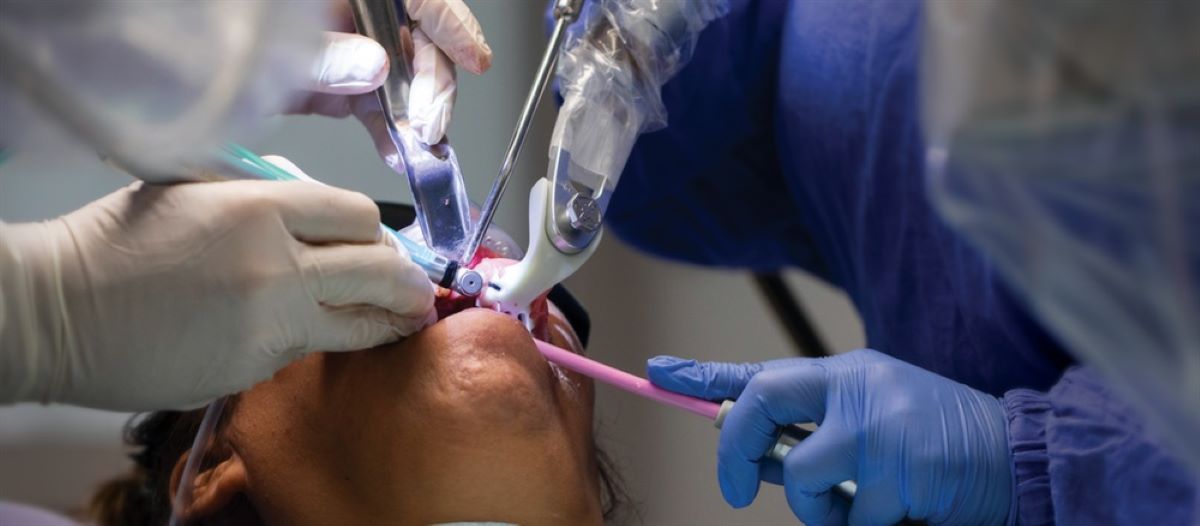

Dr. Safwan Mateen
curehealthcentre@gmail.com
03002515551
Mezzanine floor, Office # 108, plot # 24, Jan Centre, Alamgir Road Karachi Karachi - 07482
Dental implants have revolutionized the field of dentistry, providing a reliable solution for replacing missing teeth and restoring smiles. While the success rate of dental implant surgery is generally high, like any surgical procedure, it is not without risks and potential complications. Understanding these complications, their risk factors, and how to prevent them is crucial for both patients and best dentist in Karachi. In this article, we will delve into the complications that can arise during dental implant surgery, the factors that contribute to their occurrence, and the strategies to prevent them.
Infection: Infection at the surgical site is a significant concern. It can occur during or after surgery and can lead to implant failure if left untreated.
Implant Failure: Implant failure can result from various factors, such as poor osseointegration (the implant not fusing properly with the bone) or excessive load on the implant.
Nerve Damage: Nerve damage can lead to numbness, tingling, or pain in the lips, gums, or tongue. This complication is typically related to the positioning of the implant.
Bleeding: Excessive bleeding during or after surgery can occur, which may necessitate additional procedures to control it.
Bone Loss: Bone loss around the implant site can lead to implant instability and eventual failure.
Several risk factors can increase the likelihood of complications during dental implant surgery:
Poor Oral Health: Patients with underlying oral health issues, such as gum disease, may be at a higher risk of complications.
Medical Conditions: Certain medical conditions, such as diabetes or autoimmune disorders, can affect the body's ability to heal and increase the risk of infection.
Smoking: Smoking impairs blood flow and reduces the body's ability to heal, making smokers more prone to complications.
Medications: Some medications, such as anticoagulants or bisphosphonates, can interfere with the healing process and increase the risk of bleeding or delayed healing.
Inexperienced Surgeons: The skill and experience of the dental surgeon can significantly impact the outcome of the procedure. Inexperienced surgeons may be more prone to errors.
Prevention is key when it comes to minimizing complications in dental implant surgery. Here are some strategies:
Thorough Assessment: A comprehensive assessment of the patient's oral and medical history is essential. Identifying and addressing underlying conditions and risk factors is the first step.
Patient Education: Patients should be educated about the importance of maintaining excellent oral hygiene before and after the procedure.
Smoking Cessation: Encourage smokers to quit or reduce smoking before and after surgery to improve healing.
Medication Review: Review the patient's medications and adjust them if necessary to reduce the risk of bleeding or other complications.
Skilled Surgeons: Choose an experienced and qualified oral surgeon or implantologist to perform the procedure. The surgeon's expertise greatly influences the success of the surgery.
Infection Control: Strict infection control measures, including sterilization of instruments and aseptic techniques, are crucial to preventing post-operative infections.
Proper Planning: Precise planning of implant placement is essential to avoid nerve damage or damage to adjacent teeth and structures.
Follow-up Care: Ensure that patients adhere to post-operative care instructions and attend all follow-up appointments for monitoring and early detection of complications.
Use of Quality Implants: Use high-quality dental implants that meet industry standards by best dental clinic in karachi and the best dental professionals.
Ongoing Monitoring: Regularly monitor the implants and surrounding tissues to detect any issues early and address them promptly.
Dental implant surgery is a highly effective and safe procedure when performed by skilled professionals and with proper patient preparation and aftercare. By understanding the potential complications, identifying risk factors, and implementing preventive measures, both patients and dental professionals can contribute to the long-term success of dental implant treatments. Ultimately, dental implants can provide patients with a functional and aesthetically pleasing solution for missing teeth, significantly improving their quality of life.